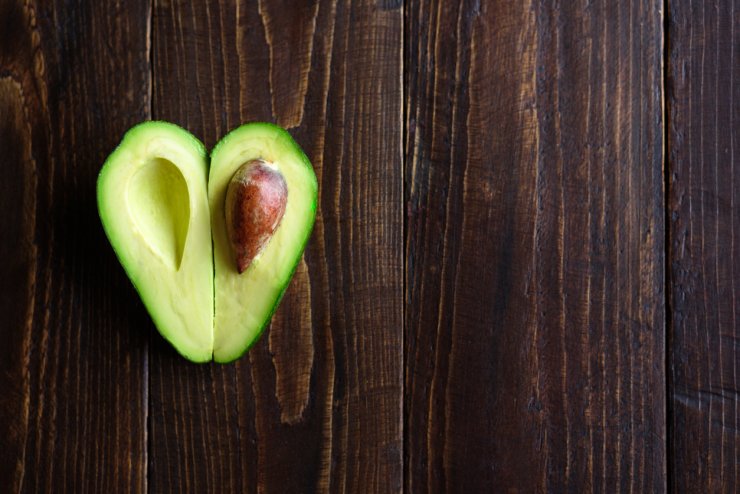
Avocados shaped like a heart.

Avocados shaped like a heart.
Avocados are clearly a healthy food to add to your diet, even with their oils and fats. Though not low-calorie, the fat is good fat that contributes to a healthy diet.
Here are some of the ways avocados contribute to good health:
Dietary fiber: Consuming foods rich in fiber, like avocados, may reduce the risk of heart disease, obesity, and Type 2 diabetes. Fiber adds bulk to your diet and makes you feel full faster, helping you control your weight. It also helps digestion and helps prevent constipation.
Folate: The folate in avocados promotes healthy cell and tissue development, which is especially important for pregnant women and infants when rapid cell division and growth is occurring. Folate is also essential for metabolism of the amino acid homocysteine and helps maintain normal levels of it.
Vitamin K: Avocados are a good source of vitamin K, an essential vitamin the body needs to stay healthy and that plays an important role in blood clotting. It is known as the clotting vitamin because without it, blood would not clot. Some studies suggest that vitamin K helps maintain strong bones in the elderly.
Copper: Copper works with iron to help the body form red blood cells. It also helps keep the blood vessels, nerves, immune system, and bones healthy. Copper also aids in iron absorption.
Riboflavin: Also known as vitamin B2, riboflavin is an essential component of two major coenzymes that play an important role in energy production: cellular function, growth and development; and metabolism of fats, drugs, and steroids.
Potassium: This has various roles in metabolism and body functions and is essential for the proper function of all cells, tissues and organs. It can help lower blood pressure by counteracting the adverse effects of sodium.
Vitamin E: Vitamin E is an antioxidant that protects the body tissue from damage caused by unstable substances called free radicals. At lower levels, vitamin E may help protect the heart. Vitamin E also plays a role in healthy skin and hair.
Niacin: Niacin is a form of vitamin B3, produced in the body from tryptophan and found in protein-containing food. Niacin is taken by mouth for high cholesterol. It is also used along with other treatments for circulation problems, migraine headache, Meniere’s syndrome, and other causes of dizziness.
Vitamin B6: This is a water-soluble vitamin that helps the immune system produce antibodies. Antibodies are needed to fight many diseases. Vitamin B6 helps maintain normal nerve function and forms red blood cells. The body uses it to help break down proteins. The more protein you eat, the more vitamin B6 you need.
Vitamin C: This is a water-soluble vitamin and antioxidant that is necessary for normal growth and development. Vitamin C is required for the growth and repair of tissues in all parts of your body. It is necessary to form collagen, an important protein used to make skin, scar tissue, tendons, ligaments, and blood vessels.
Manganese: Manganese is a mineral that is considered an essential nutrient, because the body requires it to function properly. Manganese is used to help weak bones (osteoporosis), a type of “tired blood” (anemia), and symptoms of premenstrual syndrome (PMS).
Magnesium: Magnesium is an essential mineral for human nutrition. It helps produce energy and is important for muscle contraction and relaxation.
Thiamin: Known as vitamin B1, thiamin plays a critical role in energy metabolism and, therefore, in the growth, development and function of cells.
Iron: Iron is an essential component of hemoglobin, a protein that transfers oxygen from the lungs to the tissues. As a component of myoglobin, a protein that provides oxygen to muscles, iron supports metabolism. Iron is also necessary for growth, development, normal cellular functioning, and synthesis of some hormones and connective tissue.
Carotenoids: Carotenoids lutein and zeaxanthin are plant pigments found in the macula of the eye. Some research suggests lutein may help maintain healthy eyesight as we age. Lutein is a carotenoid that may be associated with a lower risk of eye diseases, such as cataracts and macular degeneration, and may help maintain the health of skin. Avocados contain some of the highest levels of lutein and zeaxanthin per serving of any fruit or vegetable.
Avocado Home Remedies
Avocados have other benefits outside the body, too! Here are a few home remedies using leaves and fruit that you’ll find valuable for various health reasons—and to use up your crop.
Fighting a cough:
Wash five avocado leaves and boil them in water for three minutes. Let it steep, and sip it warm four times a day to ease a cough and sore throat. You’ll find that the reddish tea that results from this process has a sweet, delicate, soothing taste that is as relaxing as it is physically healing.
Relieving a headache:
Wash four avocado leaves and put them in a pot of boiling water. Make warm compresses with this mixture to place on the head, forehead, and temples. The avocado leaf contains phytochemical substances with a strong antioxidant effect.
Reducing pregnancy stretch marks:
Mix the pulp of half an avocado with a spoonful each of honey and lemon juice. Apply this mixture daily to stretch marks, massage in a circular motion, then rinse. The oils in the avocado are what make this remedy work.
Did you know that avocados could be so healthful and beneficial? Please tell us which health benefits are especially important to you.



